Squidboy is as silly as it sounds, a big bold display of physical clowning that would delight any audience. Developed for the 2013 Edinburgh Fringe, this leap into Trygve Wakenshaw’s daft mind will keep any audience beaming throughout.
Wakenshaw is a gifted physical performer, a long, lithe man with a rubberface that can cycle through dozens of expressions in an instant. His situation – A squid and a fisherman, both sure they dreamt that they were the other, so each unsure which is the real one – is quickly established, then put aside to gently draw the audience in with some involving play, winning their attention. The backbone of the performance is brought alive with mime, his body artfully shaping the world around him and reacting to the forces these imaginary things affect him with. All of this is executed perfectly, each new posture eliciting a laugh. What really fleshes out his performance are his vocal embellishments, making animals appear, enhancing the comic timing of his movements, and stressing exactly what it is he’s doing. He gleefully crunches up a bag of crisps, offers them to the audience and delights in the different ways they attempt to imitate his crisp noise. He though my noise was like a tiger’s roar, and proceeded to feed me a live lamb to satiate me, though I had to decline the subsequent offer of a cow. It’s a rarity to see a performer still enjoying themselves quite so much when performing a piece they’re so familiar with, and his enjoyment is infectious.
He spends a long time playing with repetitious and interactive jokes, and after building up a few supporting characters and jokes we return to who is dreaming. The squid-fisherman dilemma is bought back after a bit too large of a gap, and the subsequent narrative, though still very funny, loses a lot of the interactivity. It jars a little with his established rules, and leaves the audience wondering if he’ll play with them again while they should just be happy to watch.
It is a giggle a minute, but it doesn’t feel like the sky’s the limit. The performance happens in very familiar scenarios, with very defined rules and defined subversions. Part of the comedy of mime is the subversion of rules it establishes, but when Squidboy subverts he adds a knowing remark, which recognises that the subversion is part of the rules. This made the show feel a little inevitable and safe in its procedure. There’s a lot about the show that creates a sense of safety, his surrealism never quite overstepping the mark into scary or unknown territory, his cute squid costume made from comforting baby blanket material, and never quite exploring his world, only playing with it.
The only moments where there’s a sense of uncertainty is during the fisherman’s intense monologues and when a huge fly trapped in the theatre kept becoming the centre of attention. Throughout the performance, if it came close to the stage, the action would stop, a rapt expression would fall on his face and he’d lunge eagerly for the insect. This got some of the loudest laughs of the night, and his easy adaptation to a potential distraction was very impressive. It is easier to take satisfaction from the truly random, but it illustrated that this unexpected element was missing from the piece.
The performance of Squidboy is an absolute treat, guaranteed to please anybody who sees it. It does feel a little unadventurous, though, and it would be wonderful to see Wakenshaw apply his abilities to something a little more artistically challenging.

